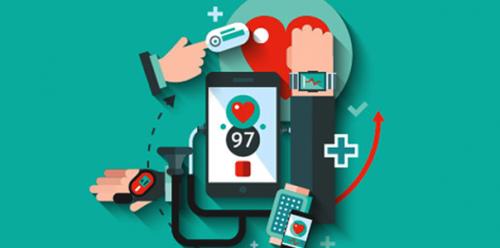3 Ways Big Data And IoT Can Improve Our Health

How health related data collected using wearable and IoT devices can improve medical decision making process and prevent certain diseases from occurring.
A few years ago people rarely knew about the terms Internet of Things (IoT) and Big Data. However, these two terms are popularly discussed today and are becoming increasingly important for retail and other types of industries making use of vast or complex networks of communicating devices and large amounts of data. In the recent years technology has advanced by leaps and bounds. Disruptive technologies have drastically changed how we analyse and plan businesses. IoT is one such technology which has greatly influenced data collection and decision making processes. Recent market trends indicate most organizations making use of IoT are manufacturing and production units, energy sectors, mobility and transportation businesses, and home automation to name a few of them. A market segment, which has recently started making extensive use of IoT technology, is the healthcare sector.
So what is IoT in a nutshell? It can be broadly understood as a technology process through which the operational aspects of the physical world can be integrated with digital platforms and which can enable information to move in a seamless manner towards computational resources that can make sense of it. Internet of things also goes hand in hand with the ‘mobile age’ and the data retrieved from various agile and mobile locations.
Contrary to what some people believe, Big Data is not a technology making use of some app or software to analyze and make sense of large amounts of data. The term “big data” refers to the use of user behavior analytic, predictive analytic, or certain other advanced data analytic methods used to extract value from data. It essentially deals with data sets that are so voluminous and complex that traditional data processing applications and software are inadequate to deal with them. Big Data challenges can include data capturing, data storage, analysis of captured data, searching for and sharing specific information, transferring data, visualizing complex data, querying, updating and protecting data privacy.
The healthcare industry, typically vary about technology adoption and slow in its implementation, now exhibits a shift from its traditional paradigm and is now readily adopting IoT and Big Data solutions.
1. Preventing illness rather than curing it
According to Forbes, accessing and analyzing large sets of health related data can greatly improve decision making process and effectively regulate how medication should be administered to patients suffering from diseases like diabetes and cancer before they become incurable. The idea is to anticipate and detect illnesses well in time before they actually start infecting or affecting the patients. If it becomes possible to understand how illnesses enter and affect patients, individuals can be warned about any impending symptoms or hereditary factors in time that could result in serious conditions later on. Armed with sufficient data, the warning signs of serious illnesses can be identified early so proper treatment can be administered at the correct time to make the illness less serious and easily treatable.
Healthcare costs are a constant source of contention, not just for patients but hospitals too that have to maintain infrastructure and devices to treat illnesses and medical conditions. If the number of patients being admitted in hospitals can be substantially reduced, it would make it much easy for hospital managements to treat patients suffering from chronic conditions requiring constant medical supervision and treatment. If proper data is collected and analyzed in time, diseases and illnesses can be controlled in a much better manner, and less time would be required to treat the patients.
Big Data in healthcare organizations can be used to predict epidemics, cure disease, improve the quality of life and avoid preventable deaths. With the world’s population increasing by the day and since most people tend to live longer now, traditional models of treatment delivery are drastically changing and giving way to new methods and processes driven by data collection and analysis.
Healthcare costs are a constant source of contention, not just for patients but hospitals too that have to maintain infrastructure and devices to treat illnesses and medical conditions. If the number of patients being admitted in hospitals can be substantially reduced, it would make it much easy for hospital managements to treat patients suffering from chronic conditions requiring constant medical supervision and treatment. If proper data is collected and analyzed in time, diseases and illnesses can be controlled in a much better manner, and less time would be required to treat the patients.
Big Data in healthcare organizations can be used to predict epidemics, cure disease, improve the quality of life and avoid preventable deaths. With the world’s population increasing by the day and since most people tend to live longer now, traditional models of treatment delivery are drastically changing and giving way to new methods and processes driven by data collection and analysis.
2. Wearable devices
For years app manufacturers have tried to cash in the health market by making “health” apps focusing upon trivial health and fitness aspects such as counting calories and measuring how many times a person has jogged the pavements or the treadmill. However, for the health-conscious and tech-savvy individuals, the recent explosion of wearable tech devices in the market has created a special need to use technology for purpose that is more... Read more.
Advertise on APSense
This advertising space is available.
Post Your Ad Here
Post Your Ad Here
Comments